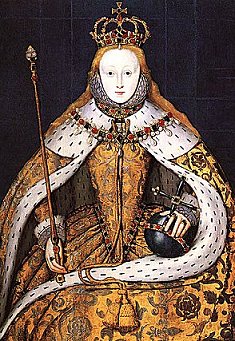

http://englishhistory.net/tudor/monarchs.html
Elizabethan period
To read
Shakespeare’s History Plays without knowing what was the context of their first
reception like,
Elizabeth I
reign is to miss much of the meaning of the references that they carry with
them. Shakespeare was interested in narrating events that took place at the time
of his writing but his was not the work of a chronicler, Shakespeare aimed for
more. In his plays, history is not the purpose but the means to reach a critical
analysis of a period and a society which was the
Elizabethan society.
In
order to understand all the complexities surrounding the plot of the
Shakespearean plays we have to refer to the advent of the
Tudor Dinasty and to its
relationship with all the other organizational elements especially the church
and the state.
The war
issue is a an important issue that preceded the Tudor period being
the war of the
roses probably the most important one. In the Tudor period there were
three wars worth mentioning that started in the wake of Henry VI’s mental
breakdown in 1453. All these wars were surrounded by political affairs
over throne possession. These wars were the ones that later Shakespeare
would describe in the plays about the life and reign of Richard II, Eduard IV,
King John, Henry VI and Richard III.
The
Tudor propaganda of the descriptive chronicles tried to convince the people that
this was the proclaimed dynasty that was going to save the kingdom and set the
new beginning in the English history.
But the
internal affairs of the kingdom characterized by a great disorganization had
transformed the reign in an ungoverned chaos. The reigns of Edward VI and Henry
VII were successful because they had the help and advice of hardworking and
experience councillors. The council at the time became a real governing
institution and appeared as a necessity in the construction of a reform for the
kingdom
Under
the government of Elizabeth I, stability is established in the country due to
the development of the industrial capitalism and a remarkable growth of the
population.
It is
during this time when Shakespeare is set.
Characteristics of the
theatre production:
English
public was a witness of the development of the national scene to a much more
realistic theatre as a mean of popular amusement.
It is in the decade of the 1590 when theatrical production acquired a
great development and became a popular pastime.
Theatres could afford up to three thousand spectators as it happened with
The Globe
in which Shakespeare performed his plays with the company called
Lord Chamberlain’s
men and Shakespeare became one of the share-owning partners in a theatre.
Considered a purple profession, acting was a precarious way of life even during
the relatively enlightened reigns of Elizabeth and James.
It is
known that women were not allowed to participate in the plays so the role of
women had to be performed by the younger actors.
Most
stage players were vulnerable to arrest on charges of vagrancy if they were not
under the protection of a powerful sponsor. Shakespeare's company at the Globe
was set apart by virtue of being formally patronized by first the Lord
Chamberlain of Queen Elizabeth and then by King James I himself.
In
Shakespearean plays, we easily see the influence of the medieval tradition of
the Morality Plays. It
is well known that Shakespeare had a critical attitude towards the moralities
which are in the background of the English drama and had an explicit didactic
control of the narrative through the allegorical use of characters, but
Shakespeare conceived the characters in a universe that went beyond the plot to
a macro universe of chaos and order. Shakespeare differently from the morality
plays which were didactic and symbolic, interested in communicating ideas, used
history more objectively and dramatized the different periods of history in a
particular way. It does not mean that Shakespeare’s characters are realistic
rather they move far beyond the achievements of the morality writers. The
chroniclers of the time were paid by their kings to please them narrating their
own deeds. Shakespeare, on the contrary, dealt with characters that were in the
realm in the terrestrial and the divine and was concerned with the problems that
had overpowered England, specially the civil war and the break with Rome. In
this sense, themes such as rebellion and justice were present in several of the
plays. The Elizabethans wanted to believe that the norm was the natural state of
things and that Shakespeare followed this idea representing it in some of his
place. He mixed drama and comedy and he made his plays more genuine rather than
a copy of a chronicle.
Having
chosen as his main character the figure of England and not just the figure of a
particular king, he treated her as a heroin who had to go through war but
managed to encounter the order and the peace with the announced government of a
good Queen, Elizabeth.
Sources:
http://www.elpais.com.uy/Suple/Cultural/07/12/21/cultural_320481.asp
Visited 12 December 2008
http://www.questia.com/PM.qst?a=o&d=99929506
Visited 07 January 2009
http://descargas.cervantesvirtual.com/servlet/SirveObras/01715529104585000770035/014544_11.pdf
Visited 11 January 2009